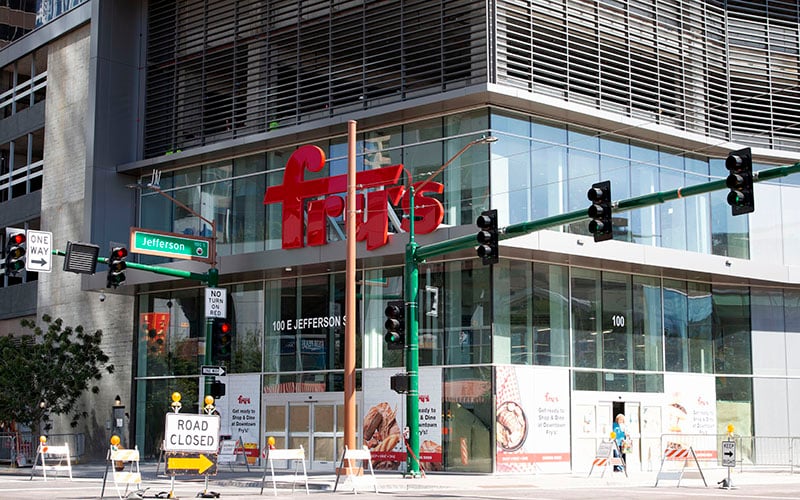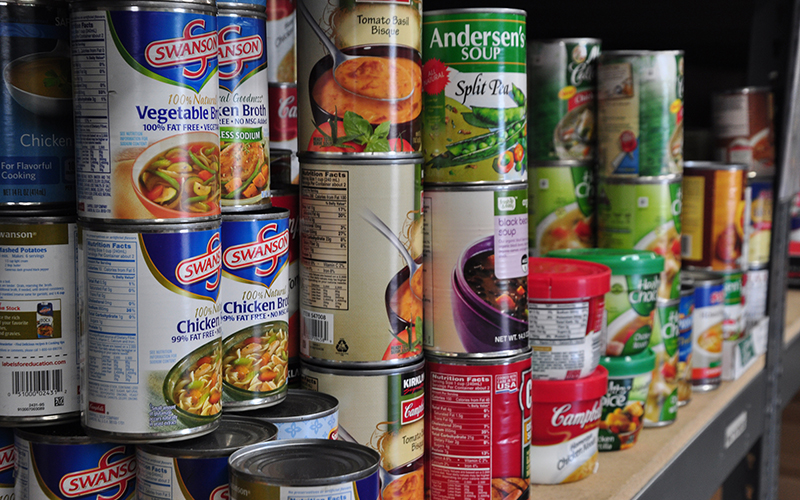PHOENIX – Empty store shelves symbolize the frustrations and fears of the COVID-19 pandemic, with toilet paper, rice, beans and water in scant supply and purchasing limits imposed so more customers have a chance to buy such staples.
Mark Miller, president of the Arizona Food Marketing Alliance, in an email interview, discussed how panic led to hoarding but warehouses are being replenished, the rising popularity of grocery delivery services and the appreciation felt by industry employees who are working hard for Arizonans. He emailed answers on March 27 to questions, which have been lightly edited for clarity.
What does the food alliance do? Are only major grocery chains members, or are ethnic markets and small, independent grocers members as well?
The Arizona Food Marketing Alliance is a trade organization that helps with education, legislation, regulation and connecting. We represent most of the food industry – this includes large local and corporate grocery chains. AFMA supports independent grocery stores throughout the state and helps the convenience store industry with the same goals. Our members are made up of the wholesalers, brokers and suppliers that service grocery and convenience stores with their food and beverage needs.
We’ve seen customers treat grocery store workers like heroes, such as thanking them for their service. What is that like?
The last several weeks have been very difficult for the first responders and the entire medical community. This same pressure is being felt by the entire food industry. This industry is made up of some of the hardest working people you will ever meet. This includes those involved with transporting food and beverages from the distribution centers to stores and those responsible for stocking the shelves and checking out shoppers. The grocery and food service industry has always focused on customer service and taking care of the customer. They’ve risen to the occasion to shine and have set a new standard in delivering world-class customer care during this, one of our nation’s biggest crises.
What is Arizona’s grocery industry doing to provide an uninterrupted food supply to the state’s grocery stores?
Looking back just a few weeks ago, our stores were full and well-merchandised. Our distribution centers had plenty of product on hand to keep all the stores full and well-presented for many weeks. Then the panic hit, the stress went across the state like a fire.
Our customers were unsure and frightened that they were not going to be able to get the food they needed to feed their families. The word came that the restaurants were starting to close. This started more panic throughout the industry. The panic caused shoppers to over buy what they considered to be the essentials. This included sanitation items, paper goods and most food items. Stores were under pressure every day to replenish merchandise that was sold out.
This panic caused most stores to put limits on the number of items that each customer could buy. These limits have helped to slow down the over buying and that is giving the industry a chance to replenish our warehouses.
There may have been other times in history that limits were placed on customers purchasing certain items, such as World War II. But America traditionally is seen as the land of plenty. What do you say to people alarmed by empty shelves?
America has one of the best food systems in the world. Our sophisticated systems ensure that our stores have the ability to satisfy all the demands from our customers. The uncertainty triggered hoarding on several high demand items. The hoarding caused the fear, the fear amplified the overbuying. Arizona has a large food supply that was moved very quickly into homes. We are starting to see improvements over the last several days. With product limits, we believe our customers will start to see less out of stock, and that should calm the over purchasing of items.
Is the issue one in which such items as chicken and toilet paper aren’t available in grocery store warehouses, or is manufacturing and processing not keeping up with high demand no one envisioned?
Certain items that come from animals have a natural limit. A hen can only lay one egg over a 24- hour period. A cow can only produce so much milk in a given time.
Is it hard to force limits on the number of products customers are allowed to buy?
Our stores are in the customer service business, so putting these limits on these high demand products was not an easy decision, but it was necessary.
In some U.S. stores, the police or the National Guard have been brought in to restock shelves and enforce purchase limits on certain items when they become available. Your thoughts?
This is not the case in Arizona. The National Guard is helping with transportation and stocking in some stores. Some stores do have security guards on a normal basis. While there have been a few issues, in most cases our customers have been appreciative and supportive of our employees.
Several chains, such as Bashas’ and Safeway, are reserving special hours for seniors, who are thought to have the highest risk of infection. Do you expect that to continue, and what has been the response from seniors?
We are not sure at this point. We will continue to keep our vulnerable customers safe during this crisis.
Are rural areas or any other areas in Phoenix and elsewhere experiencing more shortages on food and other household items such as hand sanitizers and toilet paper?
The shortages on high demand items are consistent throughout the entire state.
What are some measures that you are taking to protect workers at grocery stores and other food supply companies when it comes to the exposure to the coronavirus?
Several stores will be installing clear plexiglass to ensure customers and checkers have a barrier and safe distance at the checkout.
Have you observed a changed pattern in shopping habits and where is the change the most obvious?
We have seen a dramatic increase in grocery deliveries and pick up at the stores.



